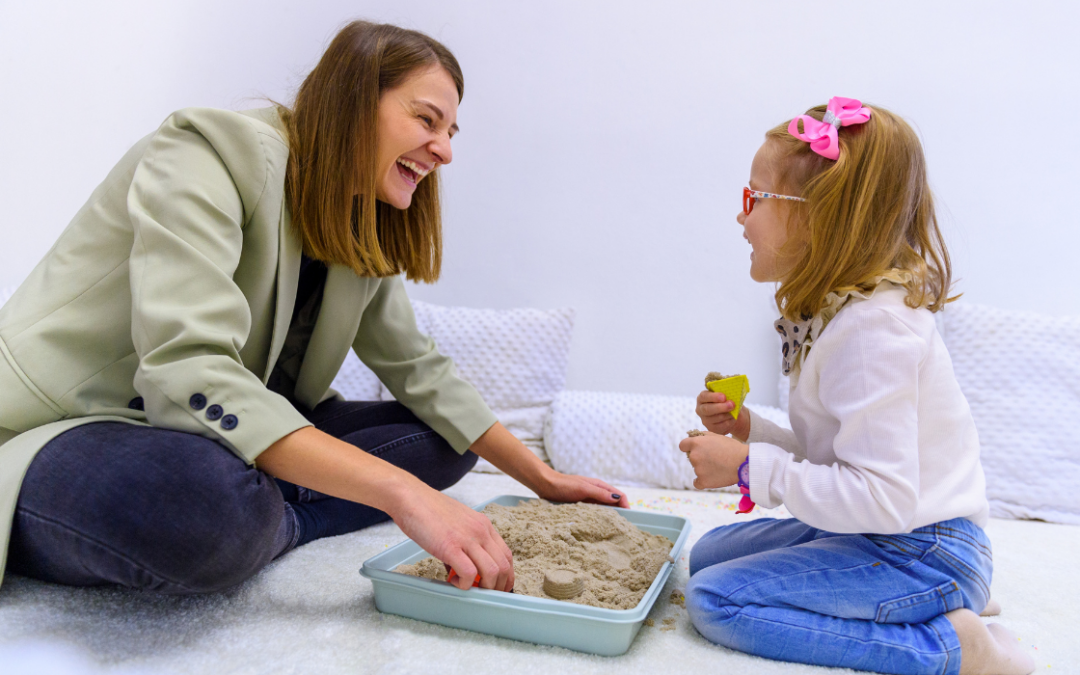
Change can be hard for anyone, but for young children, it can feel especially confusing and scary. Divorce, the loss of a loved one, moving homes, or even starting a new school can stir up emotions that children don’t yet have the words to express. Instead, their feelings often show up through behavior—tantrums, nightmares, regression, or withdrawal.
This is where play therapy for emotional regulation can make a difference. At Cultivate Therapy, Alison Urban, LCSW, RPT™, helps children ages 5+, process big emotions and experiences through the natural language of play. In a safe, supportive space, children can explore their inner world, make sense of what they’re feeling, and begin to heal.
Why Play Therapy Works for Emotional Regulation
For children, play is not “just play.” It is communication. Through toys, art, stories, and imagination, kids act out the things they struggle to explain in words. Play therapy for emotional regulation helps children externalize their feelings so they can be seen, understood, and soothed.
According to Alison, a Registered Play Therapist, “When we want to connect with a child and help them feel safe, express, and heal, we start with play.” During sessions, Alison creates a child-led environment filled with creative tools like puppets, sand trays, and art materials. Here, a child can express anger, sadness, or fear in a way that feels natural and non-threatening.
Over time, children begin to experience a sense of control, confidence, and calm. Their nervous system learns how to regulate, and they develop emotional skills that will support them for life.
How Play Therapy Helps After Divorce, Loss, or Big Transitions
Big life changes can shake a child’s sense of safety and stability. Divorce, moving, or losing someone close often bring feelings of abandonment, guilt, or confusion. Without help, these emotions may show up as aggression, withdrawal, or anxiety.
Through play therapy, children can:
- Rebuild a sense of safety and trust after family changes
- Express grief or sadness they cannot verbalize
- Learn healthy coping skills for stress and uncertainty
- Strengthen attachment and communication with parents
- Develop emotional awareness through guided reflection
In each session, Alison observes the themes in a child’s play and gently helps them make connections between their experiences and feelings. Parents are also included in the process, learning how to support emotional regulation at home and build stronger connections through play.
What Parents Can Expect from Play Therapy Sessions
Play therapy is not about fixing a child’s behavior. It is about understanding what the behavior is communicating. In the playroom, a child might act out arguments, fears, or wishes using dolls, sand figures, or drawings. These moments give the therapist important insight into the child’s inner world.
Alison works closely with parents to share observations and strategies that encourage regulation outside of therapy. This might include:
- Setting consistent routines and expectations
- Practicing emotional labeling (“I can see you’re feeling mad right now”)
- Using play at home to strengthen parent-child connection
- Teaching co-regulation techniques, such as calm breathing or safe touch
Parents often find that these simple shifts improve their child’s mood and confidence, while also deepening family communication.
The Link Between Play Therapy and Emotional Regulation
When children experience trauma or stress, their nervous system can stay in “fight, flight, or freeze” mode. This makes it hard for them to focus, sleep, or respond calmly to challenges. Play therapy for emotional regulation helps calm this overactive system by creating a safe, repetitive, and creative environment where healing can occur naturally.
Through play, children practice regulating emotions in real time. They might feel anger while knocking down a tower of blocks, then joy as they rebuild it. They learn that emotions rise and fall, and that they can move through them safely. This is the foundation of lifelong emotional resilience.
Common Questions About Play Therapy
- What age is play therapy best for?
Play therapy is most effective for children between ages 3 and 10. At this age, children communicate primarily through play, making it the ideal way to explore emotions and experiences they cannot yet verbalize. - How long does play therapy take to work?
Each child is unique, but many parents notice improvements within a few months. As trust builds and a child begins to feel safe, sessions help reduce behavioral issues, anxiety, and emotional outbursts. - Can play therapy help with emotional regulation after divorce or loss?
Yes. Play therapy helps children process grief, fear, or anger that often surface after major life changes. It gives them tools to identify and manage emotions, leading to better emotional regulation and improved relationships. - Do parents participate in play therapy?
Parents play a vital role in their child’s healing. Alison includes parents in the process by offering feedback, guidance, and simple techniques to use at home. Over time, parents learn how to respond to their child’s emotions with empathy rather than frustration.
Healing Starts with Connection
Children do not need to be “fixed.” They need to be understood. Play therapy for emotional regulation gives them the language, safety, and support to make sense of their inner world and feel secure again.
If your child has been struggling after a big life change, Cultivate Therapy can help. Work with Alison Urban, LCSW, RPT™, a compassionate therapist who specializes in helping children navigate difficult emotions through the power of play.
Give your child the space to heal, grow, and thrive.
Get Started – Cultivate Therapy

